

In this issue
Refugee Week
Human rights
Spotlight on Gaza
The power of art
Broken asylum system
Solidarity in adversity
Value of foodbanks



Refugee Week
Human rights
Spotlight on Gaza
The power of art
Broken asylum system
Solidarity in adversity
Value of foodbanks
Refugee Community Kitchen
P3
P4
P5-7
P8-9
P10
P11
P12
P13
Conversations from Calais P14-15
Mariia’s story P16-17
Detention scandal
P21
Sport P24

Exodus is a non-profit magazine produced by a small group of volunteers to give a voice to refugees seeking a new life in the UK.
Exodus team: Jean-Marc Hall, Souran Soleimani, Martin Trepte, Helen Ball.
Contact: exodusfanzine@gmail.com
AS WE move towards the end of 2024, we are constantly reminded of the enormity of people seeking sanctuary and peace around the globe.
The world is currently experiencing a record number of conflicts and crises since the end of World War Two.
Ukraine, Gaza, Sudan, Syria. The list goes on.
A catastrophic humanitarian crisis and the problems caused by climate change have displaced up to 300 million people in need of humanitarian aid.
Millions of people will move from areas effected by water shortage and drought and millions more will flee to safety from war, across country borders to seek a better and safer life for themselves and their families. The political climate around the world projects a sense of pessimism and despair as countries see the rise of nationalism and the election of populist leaders on a wave of division and misinformation most recently Donald Trump’s victory in the United States.
This is fuelled by a largely right-wing mainstream media and unregulated and irresponsible social media platforms. However, through adversity, incredible and courageous stories are made.
We hope to highlight these stories in all our issues of Exodus and in some small way be an antidote to the toxic narrative that brands refugees and asylum seekers as ‘others’ and somehow less deserving of compassion and support.
As anyone who has met a refugee will tell you, the opposite could not be more true. And we hope you will share the stories in Exodus to spread the understanding that those seeking sanctuary are people just like us.
Exodus continues to inform the reader with stories of how people are affected by the effects of global movement. Why and how they are here. How they are managing in new homes among the communities in the UK. Families, young men and women, all seeking a better future.
Jean-Marc Hall
IN SEPTEMBER, I had the chance to attend the Community Fair at the University of Reading as a representative of Exodus magazine. The fair, organised by Reading Students’ Union during Welcome Week, aimed to help new students connect with local groups, discover volunteer opportunities, and learn about local support services. It was lively, with more than 100 stalls representing different causes, organisations, and support services, creating an open and welcoming atmosphere.
I was invited to join the Care4Calais stall, set up beside Amnesty International. Alongside my colleague Helen, Sam and the managers of these organisations, we spent the day engaging with students and other visitors. We introduced them to our work, listened to their thoughts, and answered questions. Many students showed a genuine interest in community involvement, especially in areas like human rights and support for refugees.
Throughout the day, we had meaningful conversations with students and visitors. It was inspiring to see how eager they were to learn about and contribute to these causes.

This experience provided Exodus with invaluable material for future articles. We plan to feature detailed reports, interviews, and stories from this event in the next issue, sharing the insights and connections we gained.
Overall, the Community Fair not only allowed us to connect with students but
also gave us fresh perspectives and new ideas for our magazine. It was a memorable experience that strengthened our bonds within the university and local community.
Souran Soleimani


THIS year’s Refugee Week, which ran from June 17-23, saw a huge range of events aimed at dispelling disinformation about those seeking sanctuary and making the UK a more welcoming and sustainable place for all.
Under the theme of ‘Our Home’ the week brought together refugees, and the volunteers and organisations that help them, with their local communities
From the places we gather to share meals to our collective home, planet earth: everyone was invited to celebrate what our ‘Our Home’ means to them.
Home can be a place of refuge, a feeling or a state of mind. It can be found in smells, tastes and sounds. From the clothes we wear to the words we grew up with. It’s in food, music and arts. It’s in our cultures and in our landscapes.
Home can be more than one place and finding it can be a journey, as it is for so many who have to leave their countries and rebuild their lives. Sometimes home can be found in a single person. Other times it’s in a whole community. And often, it’s in a single gesture of care and welcome. Our home is also global. We are interconnected; we share the earth’s resources, climate and its challenges. Millions of people are being displaced from their homes because of the climate crisis.
But, exchanging knowledge, both new and traditional, can help us in practical ways to build hope for the future.
Events across the country included celebrations showcasing diversity at universities which have achieved College of Sanctuary Status, arts events in London and Newcastle celebrating the creativity and history of refugees and migrants, film screenings and an art workshop for women in Bradford.
Dr Dima Mekdad, co-chair of Refugee Week, said: “Refugee Week, a festival that seeks to celebrate what is so often demonised, grows each year in the UK and around the world not because it is an escape from

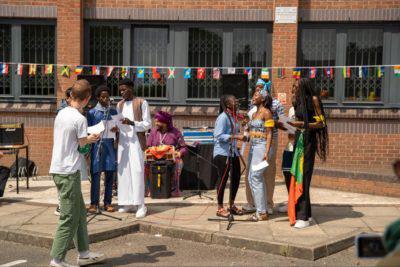
the brutal realities of displacement, but because it is necessary. Joy is essential. Creativity helps us heal, reflect on what we have lost, and imagine what might one day be possible.”
She said more than one million people took part in Refugee Week this year, in arts centres, cinemas, community venues, schools, parks, and homes across the country and the world.
“Celebrating together makes us strong-
er, more determined, and more able to move forward with our own lives and to lift our voices in support of those everywhere who are struggling to survive.”
Refugee Week’s message was that even simple acts like having a chat, walking together, or sending words of welcome can help everyone feel like they belong. And that together we can work in solidarity to ensure all our neighbours, new and familiar, have safe and welcoming homes.

LEADING human rights charity
Amnesty International UK (AIUK) has welcomed some key announcements by the UK’s New Government regarding our broken asylum system.
The government immediately confirmed it would be scrapping the Rwanda scheme – a decision made clear in their manifesto.
AIUK welcomed the news while reiterating their full range of demands regarding asylum reform:
End the policy of not processing claims on arrival
Create safe, legal routes
Tackle the backlog of cases, ensuring fair and prompt decisions
AIUK also welcomed the Government announcement in July that the contract for the vessel Bibby Stockholm would not be renewed past January 2025.
The charity said: “UK Government announced that the Bibby Stockholm asylum barge will close. It’s correct that this inhuman practice must end. We need to see the use of this barge ended as soon as possible, as well as former military barracks and similarly unsuitable asylum accommodation.”
Prior to the election on July 1, in an interview with ITV News Anglia’s political correspondent Emma Hutchinson, Sir Kier Starmer spoke about closing sites used to detain asylum seekers, such as Wethersfield.
He said: “I do think Wethersfield needs to close. Obviously, that’ll take time, because the problem that we’ve got at the moment is we’ve got tens of thousands of asylum seekers whose claims are not being processed. That is unsustainable.”
AIUK said in response: “We

ernment is eliminating some of these inhuman policies, policies that effectively criminalise people who are exercising their human rights to claim asylum.”
The charity wants the help of the public to keep reminding our new Prime Minister to keep human rights front and centre in all of his decision making.
Speaking at the European Political Community gathering in Blenheim Palace on July 18, Sir Kier said: “We will approach migration with humanity and with a profound respect for international law, and that’s why we scrapped the unworkable Rwanda scheme on day one, and it’s why we will never withdraw from the European Convention on Human Rights.”
AIUK said: “A lot needs fix-
ing so let’s keep reminding him how important Human Rights are.”
The call came as the chief inspector of prisons warned that the safety of immigration removal centres across the country was deteriorating and that the government’s use of them is potentially traumatising vulnerable migrants.
Charlie Taylor said the ‘worrying deterioration in safety’ at sites like Harmondsworth and Yarl’s Wood was a major ‘cause for concern’.
The Guardian newspaper reported official inspections into all of the eight main immigration removal centres where immigrants set to be deported are held before their departure found serious failures that need to be rectified urgently.
Increasingly, the centres have been used to house people who end up being released back into the community.
Officials described conditions in Harmondsworth as ‘truly shocking’ with half of those detained feeling suicidal.
Taylor told the Guardian: “Depriving someone of their liberty is a very serious act, and people should only be detained when the prospect of their removal from the country is imminent. In every inspection, we find people being held for far longer than they should be, some for years, and at Harmondsworth nearly two-thirds were being released, which begs the question of why they were being detained in the first place at great expense to the taxpayer and potentially causing additional trauma to already vulnerable people.”
After the election, more than 13,000 people called on the Prime Minister to prioritise human rights.
Read about Amnesty’s demands here. over-13000people-took-action-calling-prime -minister-prioritise-humanrights



THE Palestinian Youth Movement (PYM) has launched an international arms embargo campaign targeting the Danish logistics giant Maersk.
‘Mask off Maersk’ aims to uncover and highlight the role of the world’s second largest integrated logistics and shipping company in the transportation and supply of weapons and weapon components used by Israel in its genocidal war against the Palestinian people in Gaza.
The Palestinian Youth Movement is demanding that Maersk stop transporting weapons components for arms manufacturers complicit in genocide of the Palestinian people. It is also calling on the company to cut all contracts with the US department of Defence and all contracts more broadly that enable the genocide of the Palestinian people.
A spokesperson for the group said: “Without Maersk, these weapons would not reach Israel. By creating a global effort that will bring together labour unions, student
movements, community-based organisations and other progressive and proPalestine organisations we can pressure Maersk to end its deadly role in the arms supply chain.
‘The flow of weapons and profiteering must end - we are beyond the moment of urgency’
“A multi-tiered strategy against Maersk, including pension and shareholder divestment, labour action, pickets and direct action, legal campaigns and campus collaborations are planned to deepen relationships and unity for the struggle ahead.
“The flow of weapons and the profiteering of war must come to an end.
“Months into bearing witness to humanity’s worst atrocities inflicted on the Palestinian people, we are beyond the moment of urgency.”
In June Pro-Palestine protesters staged a demonstration at shipping giant Maersk’s offices in Maidenhead.
More than 50 people with the Palestinian Youth Movement staged a near-hourlong sit-in at the company’s offices in Market Street as part of the Mask off Maersk campaign. A spokesperson who took part in the action said: “Because Maersk has been the primary transporter for weapons manufacturers, we believe that by targeting them as a logistics company we’re targeting all of them.”
Protesters chanted: ‘Maersk workers make us proud, you can turn the ships around’ and ‘Maersk Maersk turn the tides, cut the ties with genocide’.
To find out more about the campaign and how to get involved visit https:// www.maskoffmaersk.com/

IT WAS a bright sunny day when five-yearold Jasmin stood watching her grandfather shaving his beard in the bathroom of their small house in the Al-Nasser district of Gaza.
It was the last time she saw him alive, after the explosion tore through the roof of the house, bringing down a pile of rubble that buried anything and everything.
Miraculously, Jasmin was pulled from the rubble by friends and family who were lucky to survive.
Jasmin’s parents were outside and away from the building when it was hit by an Israeli missile.
It wasn’t long before people were shouting and rushing trying to save those injured.
On that day at least 15 Palestinians were killed or injured. This was supposed
‘The unspeakable toll on civilians highlighted by five-year-old Jasmin and her parents is unremitting’
to have been a ceasefire. Jasmin’s parents, Nasser and Jamila, managed to take her to the hospital, where panic and mayhem reigned.
The hospital floors, once clinically spotless, were covered in blood and discarded bandages, with doctors shouting out hysterically between themselves and the nursing staff.
The ceasefire was meant to allow aid into Gaza and to stock supermarket shelves of essential goods like salt, yeast and flour to make bread. But ceasefires don’t always happen.
Violations of the ceasefire by the IDF, after warning Palestinians not to return to their homes in northern Gaza (to retrieve belongings), were blamed by the Israelis on Hamas. Delegates of the UN Security Coun-
cil are again calling for an immediate ceasefire to end the bloodshed in Gaza.
They warn of Israel’s continuous attacks in the strip, settlement expansion in West Bank, and regional spillover into Lebanon threatening prospects for a two-state solution.
The unspeakable toll on civilians highlighted by the story of five-year-old Jasmin and her parents Nasser and Jamilia is at present, unremitting.
We must unite to condemn Israel for
its treatment of Palestine and Palestinians and urge the UK government to respond adequately.
In response to a petition signed by thousands of British citizens, the Government said: “The UK’s role as a defender of international human rights is best realised when we engage constructively with our close partners. Unilateral condemnation will not serve the cause of peace”
Picture: Emad El Byed, Unsplash

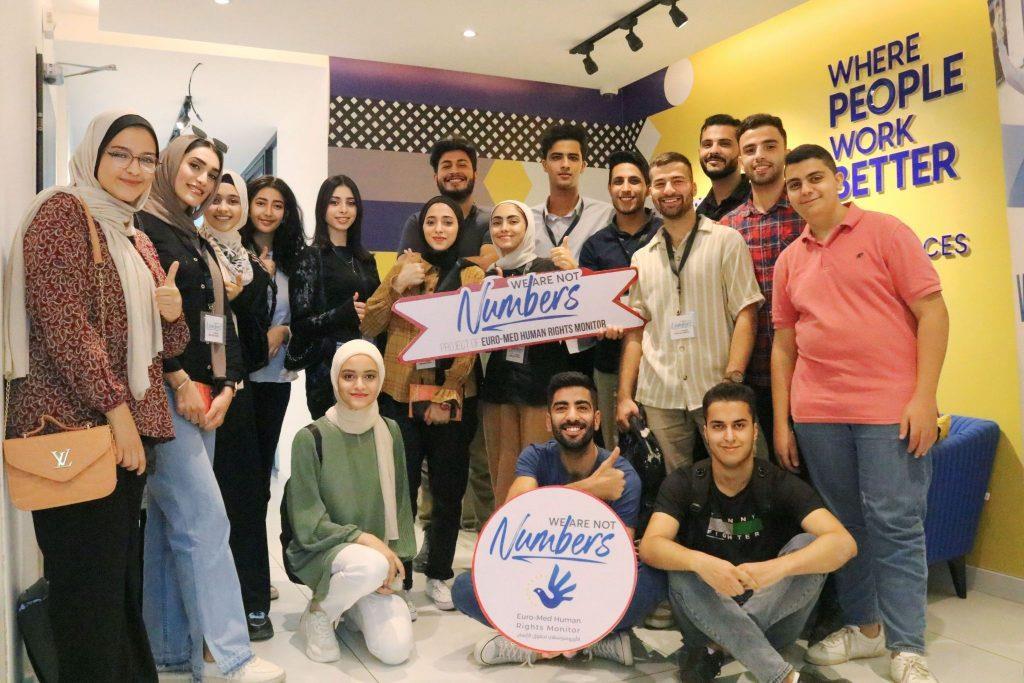
DESPITE the horrors of the genocide inflicted on the people of Gaza for a year, a Palestinian youth-led project continues to provide a platform for them to tell their unfiltered stories to the rest of the world.
We Are Not Numbers (WANN), which was formed after the Israeli military attack against Palestinians in the summer of 2014, is more important now than it has ever been.
Because when the world talks about Palestinians living under occupation and in refugee camps, it is usually in terms of numbers how many killed or injured in the latest airstrike, how many are homeless and desperate for aid.
But, as WANN says, ‘numbers are impersonal and often numbing’.
What they don’t convey are the daily personal struggles and triumphs, the tears and the laughter, and the aspirations that are so universal that if it weren’t for the context, they would immediately resonate with virtually everyone.
“That’s why established and aspiring ‘word artists’ from around the world have joined with youth in Gaza, and now Lebanon, to create We Are Not Numbers. Through this platform, we share and cele-
brate their stories, with experienced authors mentoring young writers,” says the organisations website.
WANN is a youth-led Palestinian nonprofit project in the Gaza Strip that tells the stories behind the numbers of Palestinians in the news and advocates for their human rights.
The idea was conceived in 2014 by American journalist Pam Bailey, and was brought to fruition in early 2015 in collaboration with Dr Ramy Abdu, chair of the board of directors for the EuroMediterranean Human Rights Monitor.
WANN is registered in Gaza under the umbrella of Euro-Med and its fiscal sponsor in the United States is Nonviolence International.
Pam was inspired to start WANN by her work with Ahmed Alnaouq. During the Israeli military attack against Palestinians in the summer of 2014, Ahmed’s 23-year-old brother, Ayman, was killed by an Israeli missile.
Ahmed sunk into a depression from which he thought he would never come out.
During this time, he met Pam, who encouraged him to celebrate his brother’s
legacy by writing a story. Like many young people in Gaza, Ahmed was majoring in English literature to improve his language skills.
She figured writing a story would help him achieve that goal.
Pam published the resulting story on a Western news website, and Ahmed began to come out of his depression. Pam wanted to extend these benefits to others, so WANN was born.
It pairs developing storytellers in Gaza with professional English writers from around the world to help them share their daily struggles and triumphs.
The mission of WANN is to create a new generation of Palestinian writers and thinkers who can bring together a profound change to the Palestinian cause to get their voices heard, based on peace and respect for human rights,
WANN provides the world with direct access to the Palestinian narrative without any restrictions and without foreign intermediaries speaking on behalf of the Palestinians.
The stories it tells are profoundly powerful, moving and heartbreaking and can read at: https://wearenotnumbers.org/



Simon Butler gathering coloured pencils from the razed school in Calais and with art by Kevin Francis Gray created with them.
CAN ART really change the world?
The Migrate Art project is on a mission to realise this by collaborating with renowned artists across the globe to create meaningful art and donate its profits to groups who support marginalised and displaced individuals and communities.
Migrate Art was created after founder Simon Butler visited the Calais ‘Jungle’ in 2016.
Previously working in contemporary art galleries and with contemporary artists, he felt deeply affected and wanted to help in some way.
He returned to the Jungle after it had been razed to the ground and found colouring pencils in the soil, where a school had once stood.
He gathered them up and on his return to London contacted well-known artists and asked them to make original works of art using the same pencils he had found.
He then organised an exhibition called ‘Multicolour’ in Cork Street London Galleries and held an auction at Christies, with donations going to the Refugee Community Kitchen (RCK).
In 2019, Simon visited refugee camps in Iraqi Kurdistan with a charity partner, The Lotus Flower, which provides support to women and children displaced by war.
The region had faced deliberate destruction of hundreds of thousands of acres of crops following devastating fires
attributed to organised militia groups using intimidation tactics.
Simon collected ash from the scorched land and bought it back to London and created paint using the ash as a pigment. He then distributed this to artists who used it to produce original artworks.
The project named Scorched Earth became a reality.
Using creativity to help environmental
‘Art has the power to change the world and give a voice to the politically and socially disenfranchised’ —
Simon Butler
and social causes now feels common, but in 2016 there were far fewer people and options involved.
After contacting more than 300 artists for the first project, Simon faced a significant amount of rejection.
However, the network from the contemporary art world grew and artists are now getting in touch with Migrate Art, making it part of a network of incredible organi-
sations, donating profits to many charitable groups.
The celebrated artist Idris Khan OBE contributed work to the Multicolour Project and there are several other artists that share a strong passion for using art to improve, enhance and promote a safer world.
Simon recently came back from spending three weeks in the Amazon rainforest, visiting indigenous villages and seeing firsthand the terrifying effects of deforestation on communities.
He is hoping to do a project with them along the lines of Multicolour and the Scorched Earth exhibitions.
There are also limited edition print launches and releases over the next six months from artists Chantal Joffe, Jules de Balincourt and Rachel Whiteread.
All these can be found on Prints with Purpose on the Migrate Art website at migrateart.com
Simon said: “I truly believe art has the power to change the world and inspire social change and give a voice to the politically and socially disenfranchised.
“It is more important now than ever. Creating networks and connecting people through art, using knowledge and experience to facilitate this kind of change is imperative in going forward.’
For more information about the incredible work of Simon and Migrate Art visit: migrateart.com
Jean-Marc Hall



Simon collects ash from burned fields in Iraqi Kurdistan for use in the Scorched Earth project and (below) art by Conor Harrington, Jules de Balincourt, Jason Martin, Antony Gormley who incorporated it in their work.


artist Idris Khan with a print he contributed to the Multicolour project.
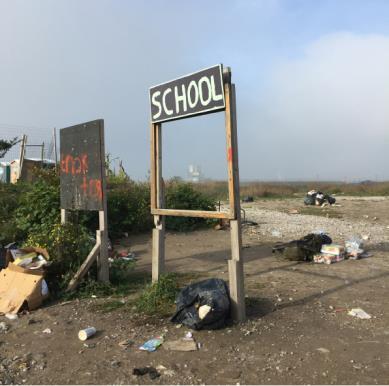


WAR, persecution and human rights violations force people to flee their homes.
When someone crosses an international border seeking safety, they often need to apply to be legally recognised as a refugee.
While they seek asylum and await the outcome of their application, they are referred to as asylum seekers and should be protected. Not all asylum seekers will become refugees, but all refugees were once asylum seekers.
We know that during the pandemic, the hospitality industry suffered heavily financially, and for many the struggle continues, especially in hotels around the UK.
Many have found themselves victims of the economic crisis and have become desper-
ate for survival. The last government gave contracts to three companies: Serco, Mears and Clearsprings, all vetted and legitimate companies, to operate hotels accommodating asylum seekers. Hotels were receiving £40-£80 a night per person and operatorswere receiving a 5 per cent profit margin.
But soon, ‘middlemen’ realised big profits could be made striking deals between the hotels and the larger operators and with rundown hotels that were desperate for business. These middleman firms have no government contract, and it is unclear about what services they provide. By adding a 15 per cent commission or a booking fee of approximately £60-£80 per person, middlemenwere taking fees and commission every time a migrant
was given accommodation.
Prices for each asylum seeker rose to £125-£147 per night.
It was also found that many of these companies were linked and owned by the same firms, none of them having been checked or vetted by the government.
The Home Office has always been clear that use of hotels as temporary accommodation for people seeking asylum is a short-term measure.
At some stage, hotels will revert from being asylum seeker accommodation to simply hotels again, but the dispersal of refugees remains paramount.
Dispersal helps counter the feeling of isolation or exclusion.
Refugees bring with them exceptional skills that enhance
and help boost the country’s economy. However, for dispersal policies to have a positive impact, there should be a good match between a refugee’s skills and the area where he or she is relocated.
Unfortunately, decisions on where to send refugees depends on availability of housing and this can place people in poorer, disadvantaged areas where housing demand is low. This can lead to misconceptions and unfamiliarity. We need a fair and progressive policy on integration that benefits all in our communities.
Migration works and evidence has shown that it is essential for the progression and wellbeing of society.
Jean-Marc Hall
Additional information: James Coney (Sunday Times)



THE knife attacks earlier this year that claimed the lives of three innocent children at a dance class in Southport, Merseyside, have left the community devastated. This heinous act is a tragedy that can never be justified.
The aftermath of this unfortunate incident saw the sparking of riots in various parts of the UK.
These so-called ‘protests’ often lacked a solid foundation and became platforms to spread hatred against a particular religion and people of colour.
The violence escalated, with damage to properties, burning of buildings and shops, and attacks on individuals. This led to the arrest of hundreds of people involved in the violence, and some of the orchestrators and participants were sentenced to years in prison.
Despite the turmoil, the majority of people rallied against racism across the UK during and after the violent protests. A silent majority emerged stronger, taking con-
trol of the streets once occupied by the violent protesters.
They made their voices heard through slogans such as ‘Refugees Welcome’,
‘As an asylum seeker, I was comforted by the outpouring of support from people from all walks of life I had come to know in the UK’
‘Stand Up To Racism’, ‘Stop the Far Right’ and ‘Migration is Not a Crime’.
As an asylum seeker, I felt worried and concerned about the situation, especially with the news being widely covered in the
mainstream and social media.
However, I was comforted by the outpouring of support from people, from all walks of life, whom I had come to know since my arrival in this country.
They checked on my well-being and reassured me that the violence and racist remarks were not representative of the majority and that the riots would be shortlived. This is certainly not only my experience, I suppose.
I found solace in the counter-protests and the expressions of solidarity from the British public. I felt more proud and confident to be in the UK, where multiculturalism is embraced, and the community has come together to stand against hatred and violence.
While the stabbings of the three children are heartbreaking and they will be deeply missed, it has revealed the strength and resilience of the community in the face of adversity.
Tamirat Astatkie

ONE OF the most meaningful experiences during my stay at Napier Barracks in Folkestone, Kent, was my involvement in the cooking project run by the Napier Friends Charity.
The practical cooking lessons took place at the Baptist Church in Cheriton, a 20-minute walk from the camp.
The project coordinator, Susanna Godden, was a tall lady with a warm smile and an easy-going personality.
Her motherly approach put us at ease and sparked our interest in the cooking lessons. What impressed me the most was Susanna's vast knowledge of dishes from diverse cultures including Arab, Iranian, West African, Habesha (Ethiopia and Eritrea), Caribbean, Indian, Pakistani, and Afghan cuisines, among others.
The lessons went beyond just teaching us how to cook.
Susanna also provided insights on healthy and affordable food options, introducing us to the concept of food banks and pantries in the UK.
These community-based initiatives play a crucial role in supporting individuals and
families who struggle to afford adequate food. Pantries, Susanna explained, operate like a shop, allowing members to choose from a wide range of high-quality groceries, including fresh produce, frozen and chilled items, meat, dairy, and long-life canned and packaged goods.
I also learned that members pay a small weekly subscription, typically a few pounds, and in return, they can access groceries worth much more.
In contrast, food banks resemble supermarkets, but everything is free.
They cater to people who face financial difficulties in affording enough food. Beyond just providing food items, food banks also offer other essential supplies.
These vital resources are often run by volunteers, churches, and charities.
According to a recent report by the House of Commons Library, the Trussell Trust distributed food parcels from 1,699 locations across the UK in 2023/24, and there are at least 1,172 additional independent food banks.
The rising cost of living has led to an increased demand for these services.
Mohammed, a Yemeni whose asylum request is still in process, shared his personal experience.
After being transferred to a shared house, where he had to buy and cook his own food, unlike at the hotel and Napier Barracks where meals were provided, Mohammed found that the weekly financial support from the government was not sufficient to meet his all needs.
He discovered that pantries and food banks were invaluable in helping him manage his situation.
However, Mohammed added that some of the food items provided did not align with his cultural dietary restrictions. The cooking project at Napier Barracks not only taught practical skills but also introduced participants to the crucial role of pantries and food banks in supporting individuals and families facing food insecurity.
As the cost of living continues to rise, these community-based initiatives have become an essential lifeline for many, including asylum seekers navigating the challenges of their new environment.


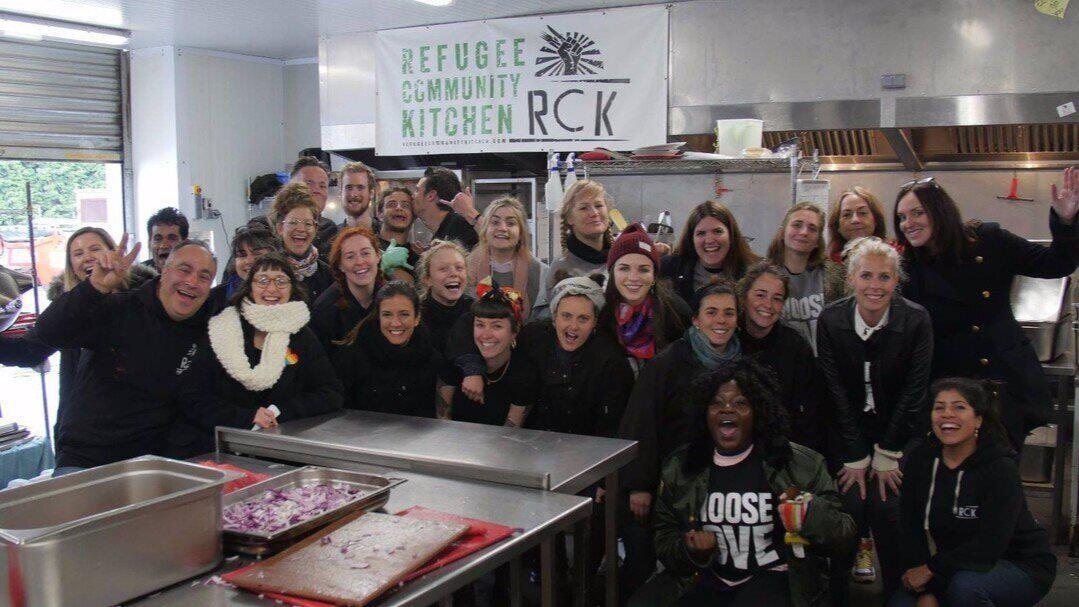
SINCE 2015, Refugee Community Kitchen (RCK) has been serving nutritious food, without judgement, to those fleeing war, poverty, persecution and climate change living in Northern France and the UK.
In Calais, RCK is providing up to 1,500 meals daily to displaced individuals, including women and children, across various distribution points.
It also distributes food on the streets of London at seven locations and is run entirely by volunteers from all walks of life.
Volunteers have told Exodus it is not just about cooking and supplying meals. It is much more than that.
They have spoken of the social and community spirit that enhances the wellbeing and general health of those benefiting from the nutritious food served. And how volunteering enhances their own lives.
One explained: “Back in 2016, the
weather in Calais was atrocious, and we felt quite overwhelmed.
“It was a humbling experience, and we felt somehow, we didn’t want to get in the way, so we had to stop and learn how we do this. I learned all about how to push flavour and serve wonderful, nutritious food.”
In the past year alone, the RCK team has carried out over 140,000 distributions across Calais and Dunkirk.
Volunteering can give life skills, kitchen skills, organisational skills and an unforgettable experience to those prepared to give their time and energy,
To find out more, visit: https:// refugeecommunitykitchen.org/
The London kitchen is in need of chefs, cooks and kitchen leads and can be contacted at: volunteering@refugeecommunitykitchen.org


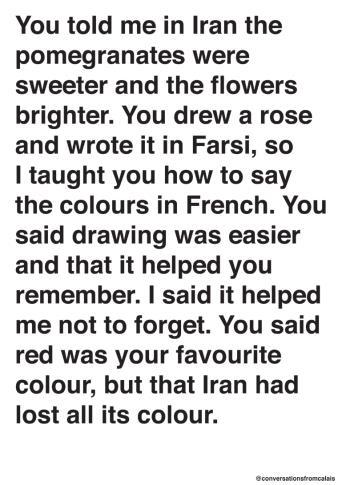
EXODUS is passionate about being able to share stories from refugees and people seeking asylum. Its aim is to humanise those who have fled conflicts, persecution or the effects of global warming and inform communities around the UK, who otherwise might fall prey to misinformation and stigmatise those who seek sanctuary and a better life.
Exodus is not alone in its message of belief and personal liberty.
Conversations from Calais, by Mathilda Della Torre is a book sharing Refugee stories which has just been published and is available to order worldwide. (amazon.co.uk) Its aim is to re-humanise those affected by the refugee crisis by using public space to share conversations between humanitarian volunteers and migrants in Calais. The project aims to bear witness to the thousands of migrants stuck in Calais by taking over public space and pasting conversations on walls all around the world, inspiring social change.
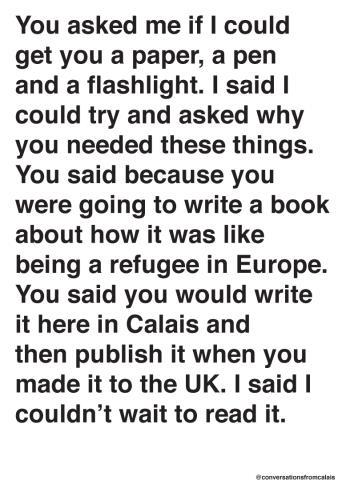
Conversations from Calais encourages all of us to cover our towns and cities in posters and they supply a downloadable guide and set of posters but ask not to change the design or add any additional information on them.
You can also submit your own conversations if you’ve volunteered in Calais. All the conversations are posted on the


the
five continents.
For more details see: https:// www.conversationsfromcalais.com/ Jean-Marc



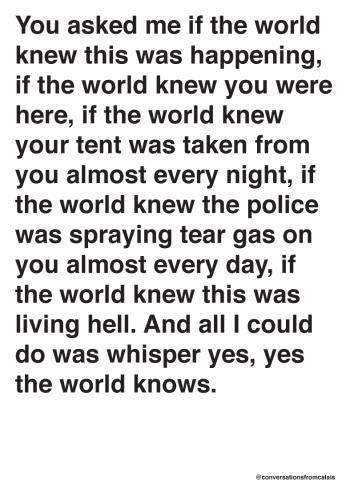

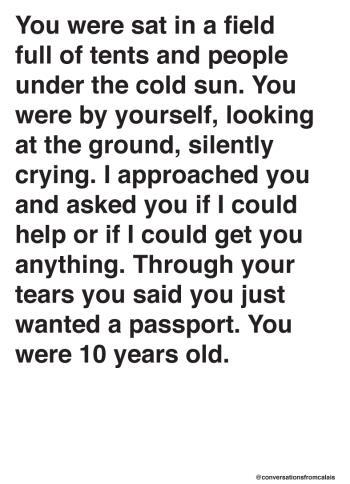




The story of how the creativity and drive of one Ukrainian woman is keeping up the spirits of troops on the frontline.
MY NAME is Mariia GishpilPetrynets, and I am 48 years old. I am a Christian, born in the small village of Podorozhne, Lviv region, in the west of Ukraine.
I am a primary school teacher and a creative person who loves working with children.
Some of my hobbies involve making Ukrainian toys, souvenirs, small gifts, and compositions. I make these by hand from threads, fabric, paper, and natural and improvised materials. Throughout my life, I have always worked with children, and I was the leader of various groups of natural and creative arts in extracurricular education.
I am divorced, and have three sons, who are 17, 23 and 26 years old. I believe that I have raised them well, and I always try to be there and support them.
The terrible reality of the 21st century has changed the consciousness of every Ukrainian. A war broke out in my free, independent, and peaceful state. It is a terrible war that destroys all living things in its path, burns, destroys, tortures, rapes, and kills.
It is very difficult to realise and accept your children are at war. Risking their lives every day, they continue to fight for the freedom and independence of our native Ukraine.
I did not give birth to my children only to see them go to war, but I am proud of their choice to defend our Mother-
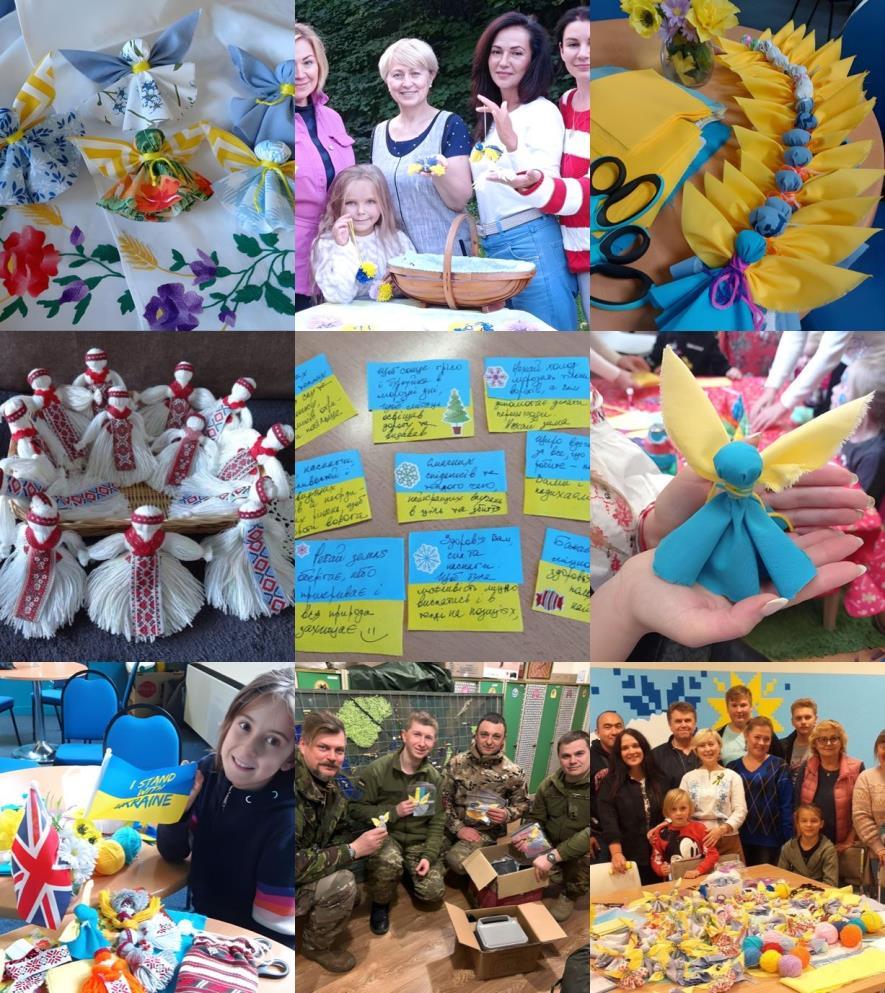
land. During the invasion by Russia of our native land, my children were working abroad.
My eldest son, Maryan, returned and on March 5, 2022, he volunteered to join the ranks of the armed forces.
It was at this time that my project "Angel for a Warrior" was born.
As a mother of a warrior
and a citizen of my country, I wholeheartedly supported the sons of Ukraine.
I understood that I had to devote my time completely in the name of the victory that my sons are winning at the frontline. The goal of the project is to help and support these warriors by making patriotic angels for soldiers. We spent
the first class in a park with anyone willing to participate. The weather was wonderful and unforgettable memories were made. I involved other Ukrainian and British children from neighbouring cities, schools, and Ukrainian centres.
I also held classes with parents and elderly people. I took Continues on P17

Continued from P16 an active part in many festivals, concerts, and other events.
Together with the children, we drew pictures and made additional crafts from paper and threads. On small cards we wrote words of support, love, and thanks for each warrior.
The funds collected from the project were used to buy warm clothing for the winter plus food, uniforms, drones, and tools to help in repairing equipment. We also put money towards purchasing materials for weaving protective nets and making trench candles.
During the two years of the war, we sent 2,300 angels for soldiers to the border zones, and to the hospitals in Kharkiv and Zaporozhye to support the wounded.
In return, we received a sincere thank-you from the soldiers. They wrote back saying that our little gifts are worth their weight in gold. Sometimes, children’s words of support are like a second breath after constant, exhausting battles with great losses of comrades.
On another note, I really like instrumental music. My grandfather and greatgrandfather were musicians in my family.
Such genes were passed on to my middle son, Yaroslav. He initially chose to not serve in the army, because music always came first.
But eventually, Yaroslav, a talented musician who dreamed of continuing his studies at the conservatory, voluntarily became a soldier of Ukraine.
Of course, as a mother, I am against my children risking their lives under shelling and bombs every minute.
It is very painful to realise that war is just a business between countries. War simply kills people for the sake of one goal: material enrichment.
I was very worried about my sons. In my head, I experienced a rampage of thoughts and questions. What else can I do to bring victory closer? How can I help? What words am I to choose when one of my sons calls and tells me about his

dead comrades? Why is evil so omnipotent? Why does evil kill the most sacred children?
Ukrainian children are left in a sea of blood and despair. It was at this time that the idea of white angels was born in
and no one has the right to take it away. I have set myself the task of a new charity project to help Ukrainian children who have suffered physically and psychologically as a result of the war. This is to help orphans
‘It is very difficult to realise and accept your children are at war, risking their lives everyday’
memory of the children killed by this cruel war. This is the genocide of a nation! So, I must shout about it, about the war!
My task is to speak and write about it so the world unites against evil. Today, there is a war in Ukraine, and tomorrow it may be in your country if we do not stop it together and punish evil.
Every person is given life
whose parents died in the war. I rallied all willing children, their parents and mentors who left their native Ukraine and came to seek temporary shelter in England to support my project.
The most recent event for it was an exhibition for which we made white angels from fabric.
Called ‘Ukraine in Angels’ Memory Forever’ it took place on September 21 on the Inter-
national Day of Peace and was a great success. The result exceeded my expectations. The exhibition itself was beautiful and there was a better turn-out than I expected. I am proud of the volunteer team consisting of 20 people. Most importantly, we collected funds to help Ukrainian children who have suffered badly from the war.
The project continued with a second exhibition held on November 24, in the Greek Catholic church on Bond Street, London.
Children’s lives and childhoods have been taken away. Thousands were kidnapped and taken to Russia, which must answer for all crimes committed against Ukraine. We are people of will and courageous strength, indomitable, because we protect our native land! There will definitely be victory! The truth is behind us and God is with us!


ON A beautiful Saturday evening in September, St Mary’s Church in Maidenhead was transformed into a vibrant centre of cultural and spiritual celebration. The event, aptly titled “The Taste of All Nations”, gathered a diverse congregation of believers from numerous nationalities and languages, all brought together by their shared faith and love for God.
The evening began with a moving prayer of thanksgiving, setting a reverent and joyful tone for the festivities. Rachel Maynell, the gracious host for the night, led the congregation in worship, expressing deep gratitude for the blessings bestowed upon the church and its community.
Her words reflected a genuine acknowledgement of God’s provision, as she invited everyone to join in a communal meal, reminding them that all the food was a divine gift.
As the congregation made their way to the dining hall, they were greeted by an extraordinary array of culinary delights from every corner of the globe. Church members had lovingly prepared dishes that represented the unique flavours and traditions of their home countries.
People eagerly sampled the diverse and mouth-watering offerings. The sense of unity was palpable as everyone came to-
gether not just to eat, but to share a true reflection of fellowship in both spirit and taste. The culinary journey spanned continents: from the rich, spicy stews of Africa to the intricate, fragrant dishes of Central Asia; from the savoury offerings of Far Eastern kitchens to the comforting flavours of Central America.
Ukrainian specialities sat alongside Iranian delicacies, demonstrating the wide variety of cultures present that evening. Each bite seemed to carry with it the love and pride of its maker, and the atmosphere was one of warmth, generosity, and divine connection. It was more than just food; it was the embodiment of God’s love shared among His people.
While guests enjoyed drinks, tea, and a delightful array of desserts, the celebration continued in the main hall with cultural performances that further highlighted the beauty of diversity within the church.
Dances and songs from different nations were performed with passion and joy. The evening’s performances and dance reflected the vibrancy and energy of the gathered community. Several groups sang Christian hymns in their native languages, their voices blending in harmonious worship that transcended linguistic barriers.
The audience was not passive; they
were drawn into a shared experience of prayer and celebration, where cultural expressions were not only welcomed but embraced. As the evening drew to a close, the sounds of lively music filled the room, inviting everyone to join in a collective dance.
Attendees of all ages participated with enthusiasm, creating a moment of pure joy where differences melted away and what remained was a united community, celebrating life and faith together. The energy in the room was contagious, fostering an inclusive environment where everyone regardless of nationality felt connected, seen, and appreciated.
“The Taste of All Nations” was not just an event; it was a profound celebration of unity through diversity, grounded in the shared love of God. It beautifully demonstrated the love of Christ knows no cultural boundaries and the richness of His creation is reflected in the diversity of His people. The evening was filled with unforgettable moments delicious food, heartfelt prayers, and a joyous sense of fellowship that lingered long after the last note was sung and the last plate was cleared.
This article, kindly reproduced with the permission of St Mary's Church, was written by one of the participants. https:// www.stmarysmaidenhead.org/

Thank you for supporting people seeking sanctuary



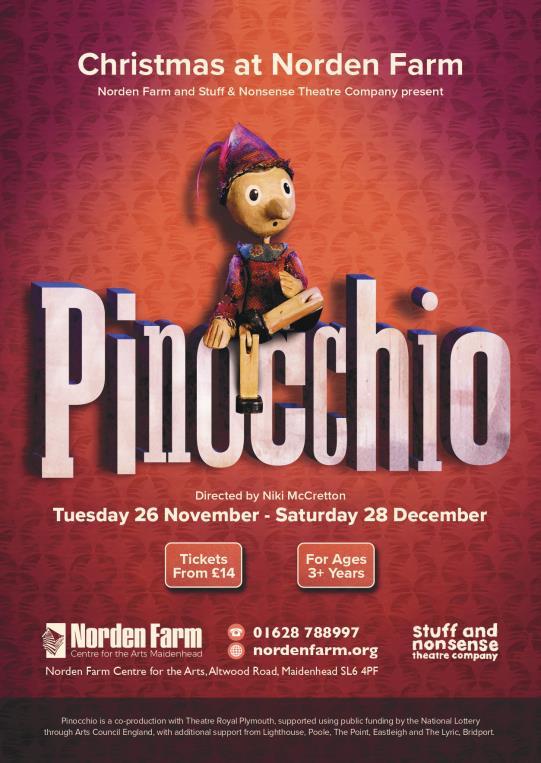

The Hundred Years war on Palestine, Rashin Khalidi
DESCRIBED as one of the best books on the the IsraelPalestine conflict, this scholarly work by Khalidi is invaluable background reading for anyone who wants to increase their understanding of the single most prominent issue in the Middle East.
Beginning in the final days of the Ottoman Empire, Khalidi moves through the critical moments of the 20th century for the Palestinian people interweaving the voices of journalists, poets and resistance leaders with his own accounts as a child of a UN official and a resident of Beirut during the 1982 siege. The result is a profoundly moving account of a hundredyear-long war of occupation, dispossession and colonialism.
While providing a Palestini-
Democracy in chains: the deep history of the radical right's stealth plan for America, Nancy MacLean
IF YOU ever wondered how neoliberal thinking came to dominate the world, eminent historian Nancy MacLean’s book tracing its origins is an ideal place to start.
From a single Southern university’s economics department, MacLean forensically charts the spread of the ideas of political economist James McGill Buchanan one of the fathers of neo-liberal economics. Amplified by thinktanks funded by Libertarian billionaires, they slowly took over American universities and political, cultural and civil institutions.
Making their way into the mainstream to displace Keynesian thinking, they have disempowered ordinary citizens while

an perspective, Khalidi takes a clear-eyed and objective approach to his subject, not sparing Palestinian and Arab leaders from criticism of their failures that have contributed to the creation of the current crisis in the region.
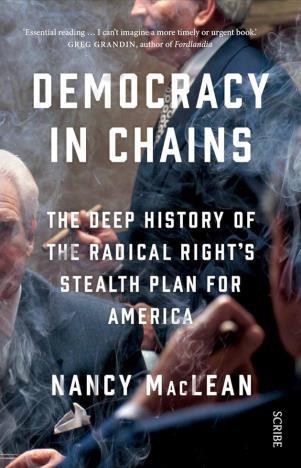
entrenching the influence of corporations as never before.
A fascinating but also quite chilling read when you consider those same think-tanks are hard at work here in the UK and were a major influence of figures such as Liz Truss...
The magnum opus of the late, great Middle East correspondent, whose 50-year career saw him write for the Express, Times and from 1989 for the independent.
An Arabic speaker, Fisk lived in Beiruit from 1976 and was one of the few western journalists to interview Osama Bin Laden.
Fisk’s eyewitness account of the events that have shaped the Middle East is alive with vivid reporting and incisive historical analysis.
The history of the Middle East is an epic tale of tragedy, betrayal and world-shaking events. It is a story that Robert Fisk was witness to much of.
Stretching to more than 1,000 pages, his masterful narrative spans the most volatile regions of the Middle East,
In this impeccably researched book, Klein continues the story of neo-liberal economics to show its impact on the rest of the world.
She details how around the globe people, corporations, institutions and states with power are cashing in on chaos; exploiting bloodshed and catastrophe to brutally remake the world in their image.
Their tactics range from undermining elected governments that might threaten foreign profits through nationalisation to engineering economic collapses and encouraging actual war.
Exposing these global profiteers, Klein reveals information and connections that shocked even her about how comprehensively these beliefs now dominate our world and how

chronicling with both rage and compassion events and wars which ‘overlap like tectonic plates’. His remarkable book is also the tale of a journalist at war and of the courage and frustration of a life spent writing the first draft of history.
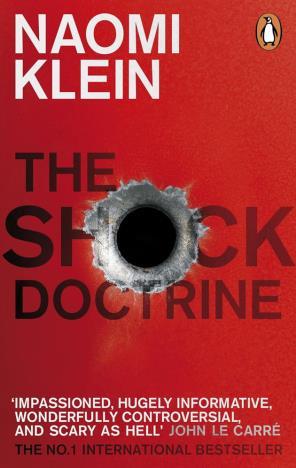
this domination has been achieved. Raking in billions out of the tsunami, plundering Russia, exploiting Iraq this is the chilling tale of how a few are making a killing while more are getting killed.
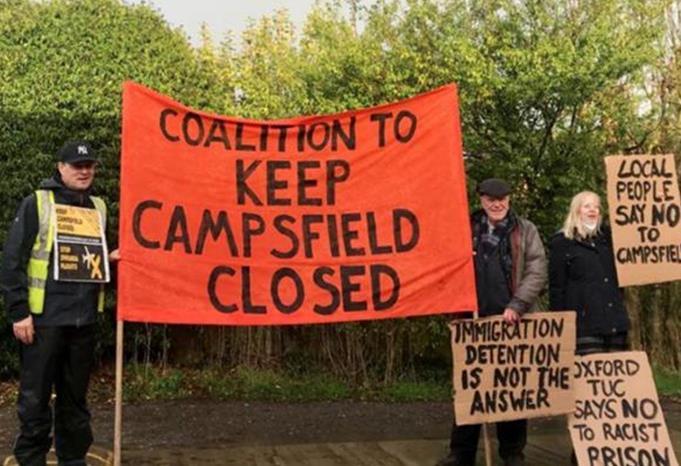
WHEN all asylum claims have been exhausted, most people are sent to immigration detention centres to await removal.
These centres have received reports that reveal appalling conditions for their inhabitants.
Harmondsworth Immigration Removal Centre had its most recent report issued in July 2024. The summary reads:
“Population pressures in prisons meant far more former prisoners were being held in Harmondsworth alongside those with no criminal conviction.
“Assaults had doubled since the last inspection and drug-taking, usually rare in IRCs, was now widespread. Inspectors could smell cannabis and saw detainees openly smoking in communal areas without being challenged by staff who largely kept to offices with ‘do not enter’ taped across their doors.
“Perhaps unsurprisingly, nearly two thirds of those detained in Harmondsworth said they had felt unsafe in the centre. Almost half of those who completed the inspectorate’s survey said they were suicidal and the centre held many men with known vulnerabilities, including 20 whom the Home Office had accepted would be likely to suffer harm from ongoing detention.“
The rest of the report makes for similarly alarming reading and is sadly typical of detention centres in the UK.
In October 2024, a man died while in custody at Brook House, an immigration detention centre near Gatwick – read The Guardian’s article about this here.
Once in these centres, there is no time limit on the length of possible detention and no judicial oversight this makes us unique in Europe.
The UK, as a signatory of the Refugee Convention, has committed to protect the rights of refugees and offer a safe haven to those in need. We are clearly failing in our duties to treat people with dignity and care.
It is therefore beyond understanding that the current government are intending to increase the number of immigration centre places this plan includes re-opening Campsfield Detention Centre, just outside Oxford and Haslar in Hampshire.
We know that immigration centres dehumanise people and we have capacity within the system, so we don’t actually need more centres.
In an article written by Gee Manoharan for The Guardian, Gee calls news of the reopening of Campsfield and Haslar “a blatant betrayal of human dignity”.
Campsfield closed in 2018, following a huge campaign in the local area, lead by the Close Campsfield Coalition. Now renamed as The Keep Campsfield Closed Campaign (KCCC), the Coalition is once again fired up to protect the rights of people due for removal.
With regular demonstrations at the site and significant advocacy work with local MPs and councillors, the Coalition aims to draw attention to this situation.
Hear different viewpoints in this recent ITV article
Can you help?
Sign up to receive the KCCC newsletter to keep informed about the Coalition’s plans and actions.
If you work with or are supported by any asylum seeker organisation, you could talk to them about joining the KCC Coalition to lend support to their work.
Get in touch with your local MP to express your outrage at the plan to reopen Campsfield & Haslar and to close other detention centres.
In the meantime, current centres need to significantly improve their services to their clients, to ensure everyone is safe.

A NEW display space at a London museum has opened with a work exploring migration by celebrated British-Caribbean artist Zak Ové, called Exodus
In the work, on display in The Reflections Room at the London Museum Docklands, Zak explores migration through the present lens, highlighting the history and challenges of major population movements through time.
The mixed media installation echoes a gridlocked cityscape, where colourful toy cars, trucks and human figurines mingle with elephants, giraffes and other wildlife towering over a scene of traffic.
It rests on two green, white and red Castrol oil drums that nod to multinational business and finance in the modern world. The work suggests a reflection on today’s discourse around migration.
It is accompanied by a wall of historic maps that present a visual sense of data on international migration, agricultural trade, and tourism between 1500 and 2005.
This invites viewers to examine the relationships between such movements and the artwork on display.
Zak said: “The history of mankind demonstrates a knowledge of humans walking freely around the Earth, often leaving in large numbers from one region to another.
“There is a theory that modern humans share a single racial stock having emerged out of Africa to replace all other populations.
“With this in mind, I set out to make a piece that spoke about the movement of people from African countries, which is symbolic of all people who find themselves in Exodus.
“In the piece, all vehicles and dolls face the same way as there is only one way out, one way to leave, and only one hope of a future elsewhere.”
Senior museum curator JeanFrancois Manicom added: “Art is a powerful tool to understand human experience in all its complexity and diversity.
“Alongside the records and objects in our galleries, we wanted a space where artists can express fears, doubts, hopes, and beliefs an opportunity to bring in new voices to the museum, including those

that are often less visible in London.
“If our collection is the body of the museum, this room is its soul, and we are delighted to launch with this work by Zak Ové and announce the news that we will be welcoming the piece to our collection following its display.”
He continued: “Migration is something which has long been at the heart of this city’s story and continues to be an im-
‘The history of mankind demonstrates a knowledge of humans walking freely around the Earth, often in large numbers’
portant topic today.”
Born in London, Zak is a multidisciplinary artist working across sculpture, film and photography.
Using themes and histories from the African diaspora to the Caribbean, he reappropriates everyday modern objects to cre-
ate playful and imaginative works that call attention to often challenging histories and how they link to the modern day.
He draws particular attention to the unmasking and re-telling of histories that have been suppressed by colonial narratives.
Zak borrows ideas from Afro-Caribbean Obeah culture and religion to address the misrepresentation that African peoples have experienced in keeping their religious and secular identities alive in the face of Western ideas of Christianity and the onset of enslavement.
His symbolic use of dolls pays reference to a belief system that was kept alive in resistance to enslavement.
Through Exodus, Zak addresses the dilemma of the displacement of people by wars fought for political and economic agendas.
Without a country of their own, they are left with few to no options, unsafe routes, and limited means to find shelter and safety.
Exodus is on display until 25 May, 2025. It is free to view as part of a general admission to the museum.
For more information visit: https:// www.londonmuseum.org.uk/whats-on/zakove-exodus/

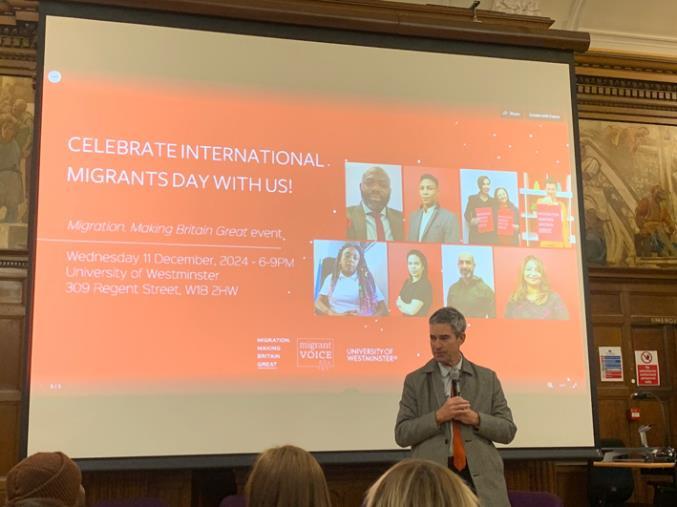

MY EXODUS magazine colleague Jean-Marc and I had the privilege of attending the International Migrants Day celebration on December 11 at the University of Westminster, organised in collaboration with the HOMELandS Centre.
The event began with a warm welcome speech by the university’s president, whose inspiring words set the tone for the day. One key take-away from the discussions was the idea of viewing migration as an opportunity a source of progress for Britain rather than a challenge.
One of the most powerful moments was when one guest, a migrant, quoted Gandhi: “Be the change you want to see in the world.”
This sentiment deeply resonated with the audience, reminding us all of the transformative potential within every individual.
Another thought-provoking speech highlighted the importance of educating children to embrace diversity in schools.
The speaker emphasised teaching young minds that migrants are not a problem but a source of enrichment.

Breaking down barriers of race, ethnicity, and division was presented as an essential step toward building a harmonious society.
Jean-Marc also delivered an engaging
presentation about refugees and introduced Exodus, our magazine. He shared how Exodus amplifies the voices of migrant communities, ensuring society is better informed about the realities of migration and its positive impact on our shared future.
We want to express our gratitude to
everyone who participated, making the event a wonderful celebration of how migration makes Britain great.
For a detailed report on this event, including an exclusive interview with the organiser, watch out for the next issue of Exodus.
Souran Soleimani


SHAYAN is a passionate athlete who loves nature, rivers, and water sports. His journey in rowing has been driven by dedication and strong motivation, and he is now on a path toward excellence in the sport.
Shayan has already made his mark in his native Iran by winning two bronze medals at the national championships and a gold medal at the Talent Olympiads, where he even broke the national record in his category. Beyond rowing, the teenager has tried 24 different sports, excelling in several. He has won regional awards in sports like water polo, kayaking, and table tennis, inspired by his father and grandfather, who were champions in table tennis.
Now, rowing has become his main focus and greatest passion.
I had the opportunity to conduct a short interview with Shayan for Exodus Magazine, where he shared his inspiring journey and future goals.
How did you first get involved in rowing, and what does the sport mean to you?
Before COVID-19, I played water polo, but when COVID hit and pools closed, my training had to stop. Then, during a talent search in my city, I was chosen for the provincial team. That moment showed me I could achieve something in sports.
What challenges have you faced since arriving in the UK, both in your personal life and as an athlete?
I haven’t had many sports-related challenges, except for a recent injury. Moving to a new country, though, has been tough. The culture here in the UK is very different from what I knew in Iran.
How has being a refugee affected your training and opportunities in rowing?
Being a refugee has limited my chances to compete. Unfortunately, I can’t participate in events in other countries.
What support have you received from the local community or sports organisations since your arrival?
The club coaches and Hilda, a member of a charity called Care4Calais, helped me restart my training here. Their support means a lot to me.
Can you share a memorable moment or achievement in rowing that you’re particularly proud of?
In 2022, I went to the Asia Cup and competed with adults, even though I was still a teenager. It was a great experience and a proud moment for me.
How do you balance the emotional and practical challenges of being a refugee with the demands of your sport?
Being a refugee in a foreign country is challenging, especially with my father still in Iran. Rowing helps keep me focused and busy, and my mother and friends here give me a lot of support.
What are your future goals, both in rowing and in your life here in the UK?
I see a bright future in sports because, in Iran, I didn’t have access to good training facilities. I mostly had to run or go to the gym. I could only practice rowing when invited to a national camp. Here, I hope to improve my skills and adjust to my new life. I believe things will get better and more stable over time.
What advice would you give to other refugees who want to pursue their passion, whether in sports or other fields?
Don’t ever give up. Keep working hard toward your goals, whether you have the resources or not.
Is there anything else you would like to add?
My coach in Iran used to tell me: ‘If you don’t have a boat, you should be able to row with two spoons and a piece of wood’. This taught me that if someone really wants to succeed, they can make it happen, no matter the circumstances.
Souran Soleimani